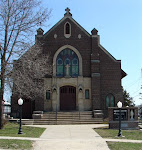The following articles were recommended by Fr. Pisut
Christianity and Frog Boiling
Riding up through the hills of uppper South Carolina you can't help but notice the huge number of churches. Every mile or so there's another one: Pebble Creek Baptist, Maranatha Church, Heritage Church, New Spring, Rocky Rill Baptist, Beaver Run Baptist, Calvary Baptist, Assembly of God, Church of God, Disciples of Christ, Christian Disciples...the names and numbers are bewildering and ever multiplying.
It's the Protestant principle run riot. The irony is that while the non-Catholics say, "It doesn't really matter what church you belong to" they seem to think it pretty important to keep breaking up with one church to go and start another one. If it doesn't matter what church you go to why not go to the one on the nearest corner? The second problem with this commonly held view is that it only takes a short jump from "It doesn't matter what church you go to" to "Well it doesn't really matter if you go to church at all."
Pope’s Glasgow Mass in Latin
- Much of Pope Benedict’s Bellahouston Park Mass will be in the scholarly language of Latin


